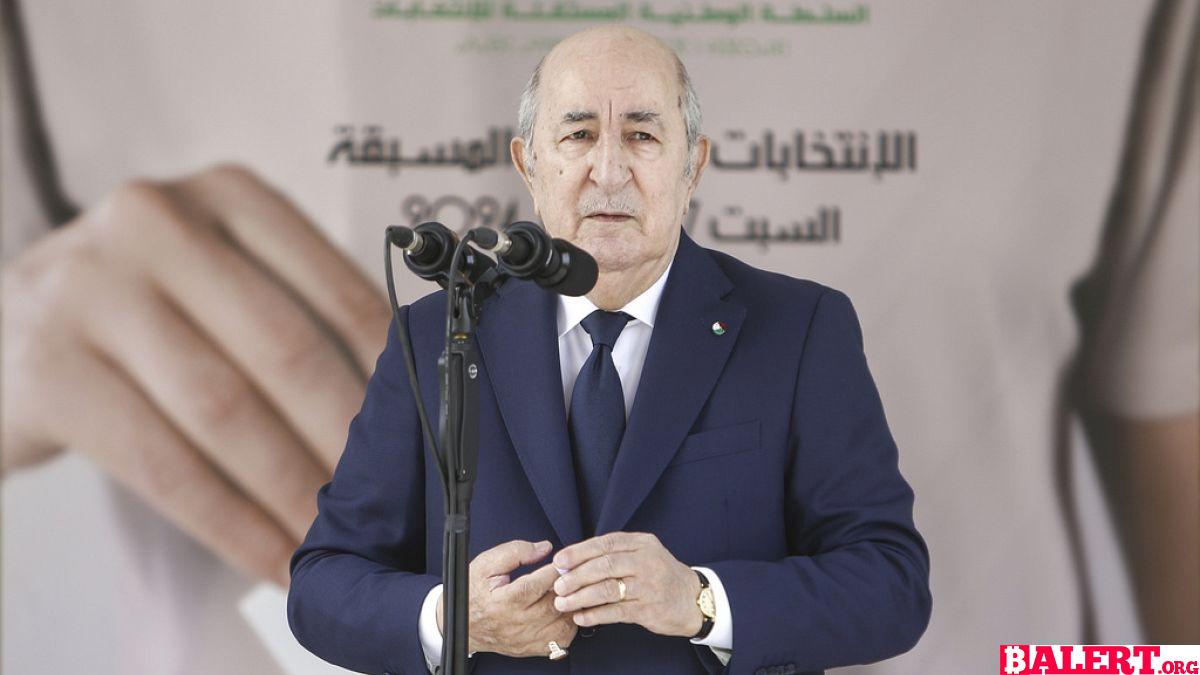World
Algeria’s Presidential Election Results Spark Controversy and Criticism
Discover the unfolding controversy surrounding Algeria’s recent presidential election results. Explore the criticisms from various political factions and public reactions as the nation grapples with claims of legitimacy and transparency.

Disputed Election Results in Algeria: President Tebboune Faces Criticism
Following his electoral victory in Algeria, President Abdelmadjid Tebboune found himself under fire from both his rivals and various political observers. The criticism centered around the National Independent Election Authority (ANIE), which announced results that starkly contradicted earlier turnout figures and local tallies, casting a shadow over what initially appeared to be a decisive reelection for the 78-year-old leader.
On Sunday, ANIE proclaimed that Tebboune had secured a remarkable 94.7% of the votes cast in Saturday’s election. His opponents, Islamist candidate Abdelali Hassani Cherif and socialist contender Youcef Aouchiche, received 3.2% and 2.2% of the votes respectively. However, just hours after the announcement, both Cherif and Aouchiche joined Tebboune in issuing a joint statement that questioned the integrity of the election process. They accused the election authority of presenting contradictory results and raised concerns about the reliability of the reported outcomes.
Officials had initially reported a voter turnout of 48% when the polls closed, a figure that was met with skepticism. Before the three candidates expressed their doubts, Cherif and Aouchiche had already indicated discrepancies based on their own tallies. This situation leaves the future uncertain, as it remains to be seen whether these irregularities will prompt legal challenges or delay the final certification of the election results.
According to election officials, approximately 5.6 million out of Algeria’s 24 million registered voters participated in the election. Such a high abstention rate, if confirmed, would exceed the 39.9% turnout recorded in the 2019 presidential elections, further complicating the narrative of a successful electoral process.
Abstention: A Message Against the Political Elite
Tebboune, often viewed as the candidate favored by the military establishment, initially won his first term in 2019 amidst widespread public discontent and a massive boycott of the electoral process. During that election, protests erupted, with demonstrators storming voting stations and law enforcement intervening to disperse crowds.
The president’s overwhelming victory has sparked skepticism regarding the authenticity of the election results and has drawn criticism from pro-democracy activists. These activists have long argued that elections in Algeria serve as a facade for the political elites to project an illusion of popular support. Many observers assert that the loudest message emerging from this election comes from those who chose to abstain, fearing that participating would only serve to legitimize the entrenched military-backed elites, colloquially referred to as “le pouvoir.”
“The vast majority of the Algerian populace has effectively delivered ‘le pouvoir’ a lesson in democracy,” remarked Nassira Amour, an educator and prominent figure in Algeria’s pro-democracy movement. “The majority opted not to vote… This electoral charade is a triumph for the Hirak,” she added, referencing the grassroots movement that emerged in 2019 advocating for democratic reforms.
The Hirak protests erupted in 2019 following then-President Abdelaziz Bouteflika’s announcement of his intention to run for a fifth term. The military intervened, leading to Bouteflika’s resignation shortly thereafter. The interim government that followed was pressured by military leaders to conduct elections later that same year, a move that angered demonstrators who viewed it as an attempt to placate the public without addressing calls for a transition to civilian governance.
In a recent statement, Amnesty International condemned Algeria’s “brutal crackdown on human rights, including the rights to freedom of expression, peaceful assembly, and association,” particularly in the lead-up to the country’s presidential elections.
Related
- President Abdelmadjid Tebboune dominates Algeria election, winning 94% of votes
- Algeria election: Turnout low after opposition calls for a boycott
World
Dominique Pelicot Testifies in Harrowing Rape Trial
Join us as Dominique Pelicot courageously testifies in a harrowing rape trial, shedding light on the complexities of trauma and justice. Her powerful story raises crucial questions about the legal system and the importance of support for survivors.

Dominique Pelicot Takes the Stand in Shocking Rape Trial
In a courtroom drama that has captivated France and garnered international attention, Dominique Pelicot, the man at the center of a harrowing rape trial, finally addressed the court. With tears streaming down his face, he recounted how his wife had been instrumental in helping him cope with a tumultuous past marked by trauma. He revealed that he had endured a sexual assault at the tender age of nine while hospitalized, and he also witnessed a gang rape during his teenage years while working as an apprentice electrician on a construction site.
“She didn’t deserve this, I acknowledge that,” Mr. Pelicot stated, his voice barely audible as he struggled to convey his emotions. The gravity of the situation weighed heavily on him, and the courtroom fell silent, straining to catch his every word.
Now 71 years old, Mr. Pelicot faces serious allegations of drugging his wife, Gisèle Pelicot, whom he has been married to for half a century, over a span of nearly ten years. Prosecutors contend that he used drugs to render her comatose, allowing him to rape her repeatedly. Furthermore, authorities allege that he went so far as to invite numerous men into their home, facilitating a nightmarish scenario where they, too, engaged in the assault of his wife.
Overall, 51 men, including Mr. Pelicot, are on trial concurrently, primarily facing charges related to the aggravated rape of Ms. Pelicot. Among them, one individual has already pleaded guilty to similar crimes, admitting to drugging his own wife to assault her and inviting Mr. Pelicot to partake in the horrific act while she was incapacitated.
Mr. Pelicot’s unexpected testimony came after a tumultuous start to the trial. Just a week in, he was stricken with severe health issues that forced him to miss four consecutive days in court. The head judge ultimately decided to postpone proceedings, as Mr. Pelicot was diagnosed with kidney stones, a kidney infection, and prostate complications, adding yet another layer of complexity to this already harrowing case.
World
Meta Bans Russian State Media Outlets from Social Media Platforms
Explore the implications of Meta’s decision to ban Russian state media outlets from its social media platforms. Understand the impact on information dissemination and the ongoing battle against misinformation in the digital landscape.

Meta Imposes Global Ban on Russian State Media Outlets
In a significant move, Meta Platforms, Inc., the parent company of Facebook, has announced the prohibition of Russian state media outlets, including RT (Russia Today) and Rossiya Segodnya, from all its social media platforms. The decision stems from the company’s concerns regarding the deceptive strategies employed by these media organizations to execute covert influence operations across the internet.
Meta made this announcement on Monday, emphasizing that the ban will be enforced worldwide across its various platforms, such as Instagram, WhatsApp, and Threads. The rollout of this ban is expected to take place over the coming days.
Statement from Meta
A spokesperson for Meta elaborated on the decision, stating, “After careful consideration, we have expanded our ongoing enforcement actions against Russian state media outlets. As a result, Rossiya Segodnya, RT, and other affiliated entities are now banned from our applications globally due to their involvement in foreign interference activities.”
For further insights into this development, watch the video in the player above.
World
Trump Recalls Alleged Assassination Attempt While Golfing
Explore Donald Trump’s chilling recollection of an alleged assassination attempt he experienced while enjoying a round of golf. Delve into the tense moments and his reflections on safety, fame, and the unpredictability of public life.

In a recent interview on the social media platform X, Republican presidential nominee Donald Trump recounted a harrowing incident he claims to have experienced while playing golf. Trump described how, during a peaceful Sunday morning round with friends, the tranquility of the day was abruptly shattered by the sound of gunfire in the air.
“It was a beautiful day, everything was just perfect,” Trump reflected. “Then all of a sudden, we heard shots being fired—probably around four or five in total.” He went on to explain that a Secret Service agent was the first to spot the suspect, who was allegedly armed with an AK-47, a powerful assault rifle.
“The agent saw the barrel of the weapon and immediately took action, returning fire at the barrel and aiming in the direction of the bushes,” Trump detailed. “I would have loved to have sunk that last putt, but we decided it was best to leave the scene promptly.”
Trump expressed his gratitude towards the agents and a vigilant civilian who aided in tracking down the suspect, who was eventually apprehended following a high-speed chase.
Suspect Faces Multiple Federal Gun Charges
The FBI has identified the suspect as Ryan Wesley Routh, accusing him of targeting Trump during his time at the golf club in West Palm Beach, Florida. According to an FBI report, Routh had allegedly hidden among the hedges of the golf course for an astonishing 12 hours. Authorities discovered an SKS-style assault rifle, a GoPro camera, and a bag of food at the scene.
The 58-year-old Routh is now facing two serious federal gun charges. If convicted on both counts, he could face a combined maximum sentence of 20 years in prison. Notably, neither of the charges is directly related to an assassination attempt. The first charge pertains to possessing a firearm despite a prior felony conviction, which carries a potential 15-year sentence, a fine of $250,000 (€225,000), and three years of supervised release.
The second charge involves possession of a firearm with an obliterated serial number, which could result in a five-year prison term, the same financial penalties, and also three years of supervised release. As the investigation continues, additional charges could be forthcoming.
While the motive behind Routh’s actions remains unclear, his digital footprint reveals strong political affiliations, particularly concerning issues surrounding Ukraine and China. Routh consistently expressed support for Ukraine across various social media platforms, even claiming to have orchestrated a recruitment scheme for international volunteers aiming to assist Ukraine in its fight against Russia’s invasion. This behavior has been denounced by Ukrainian soldiers and members of the International Legion, who disavowed Routh’s actions and motives.
-

 Business4 months ago
Business4 months agoObituary: Dan Collins
-

 Business3 months ago
Business3 months agoThe Significance of Jackson Hole: A Central Banking Tradition
-

 Gaming5 months ago
Gaming5 months agoMore than a thousand students vowed not to work for Amazon and Google due to the Nimbus Project.
-

 World5 months ago
World5 months agoRussia and North Korea Strengthen Defense Ties
-

 Business5 months ago
Business5 months agoJump Crypto Invests $10 Million in Pro-Crypto PAC
-

 Article5 months ago
Article5 months agoCreative Design Applications Developed with Artificial Intelligence
-

 Tech2 months ago
Tech2 months agoNew Leaks and Features About the Samsung Galaxy S25 Ultra
-

 Gaming5 months ago
Gaming5 months agoThe Inspirational Success Story of Avon’s Founder Who Sold Books Door to Door














